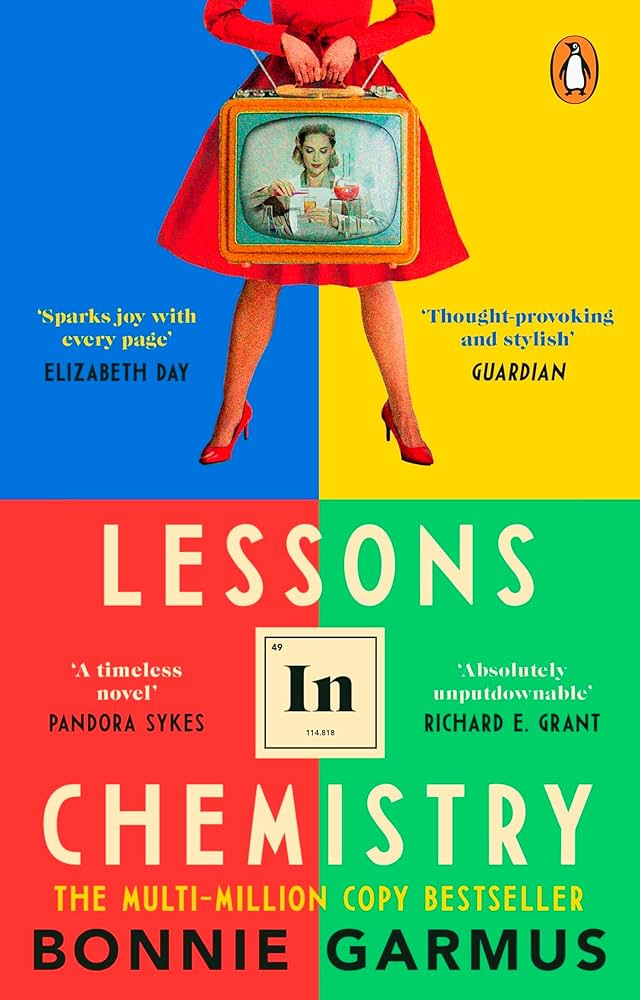Lessons in Chemistry by Bonnie Garmus
Not Another Book Club - September 2025
This was a perfect book to pick up our reading in the autumn - an enjoyable page-turner that made it easy to resume the reading habit.
On the surface, “Lessons in Chemistry” delivers exactly what you’d expect from a bestseller: an entertaining story about Elizabeth Zott, a brilliant 1950s chemist who ends up hosting a TV cooking show after workplace discrimination derails her research career. The dog’s perspective, the satisfying moments when Elizabeth dismantles pompous men, and the chemistry puns make it genuine entertainment.
But a bit like “Supper at Six” - the TV cooking show intended to bulk out the difficult afternoon TV schedule - this book is not just entertainment. It sneaks in some profound questions while you’re on the ride and doesn’t patronize the reader with simplistic answers, but trusts in the reader’s intelligence to form, and act on, their own view.
Why does authenticity feel so refreshing in fiction yet take such courage in real life? What is it that we might not be saying that needs to be said?
Elizabeth’s matter-of-fact directness felt simultaneously off-putting and liberating to us. She simply says what she sees, unfiltered by social niceties - “everything is just chemistry to her.” What struck us was how this kind of straight talk, which we might stereotype as more “male” behavior or characteristic of somewhere on the autistic spectrum, becomes Elizabeth’s way of cutting through societal absurdities.
Do we have allies who we might not see or appreciate? And who might we reach out to with an offer of support even if the fit feels awkward?
Despite Elizabeth’s talents, she couldn’t succeed alone - and her supporters came from unexpected places - including a number of men despite this being a world in which gender discrimination is rife. She also did not ask for support, but rather accepted (sometimes reluctantly) the support that was offered. In fact, while she started the book with no family or friends, she developed a relationship with this rather unconventional group that felt more like “family” to her than her own family ever was.
We read with our identities, so what can we learn about our own identity when we hear how a story resonates differently with someone else?
Each of us experienced the book differently. A female perspective might include head-nodding moments and sisterhood vibes, while a male reaction might be disgust at workplace predation and cheering for Elizabeth’s victories over unfairness. This made us curious about how the same story might resonate differently across generations, cultures, or other backgrounds. Elizabeth’s very literal worldview becomes a lens for exposing our own hidden assumptions.
What’s the alternative to accepting a flawed system or tearing it down?
Elizabeth doesn’t try to revolutionize television or overturn laboratory hierarchies - she uses what’s available and pushes boundaries from within. Perhaps she didn’t have any alternatives, but she finds a way to do what feels right to her within the (very significant) constraints in which she operates. Of course this is fiction, but it points toward an alternative to passive compliance and destructive rebellion - an alternative that might be worth considering in the many societal challenges we currently face.
How might we roll with difficult circumstances rather than fighting them?
Elizabeth never had a grand plan - she simply made the best of the circumstances that arose. Kicked out of the lab, she took the cooking show job because she needed the money. Given a platform, she didn’t preach, but educated in the same way she did at home with her daughter (and dog). This felt like a different kind of resilience than the “grit and determination” narratives we often hear. She didn’t always bounce back or overcome her challenges - she was at times overwhelmed, and it took an external event to get her moving. Elizabeth’s success seemed less about having a master plan and more about knowing what she stood for and hanging in there even when things were tough.
How far have we come? And how far is there still to go?
The book’s 1950s setting throws contemporary issues into sharp relief. We may be grateful we didn’t live then, but today’s societies and workplaces still have echoes of many of the issues the book touches on - in fact, a male colleague taking credit for the author’s work was her trigger for writing the book.
And beyond gender, where might our systems today be revolting to future generations? What might we be able to do about that?
We found “Lessons in Chemistry” enjoyable and rich - there’s plenty to cheer for, some genuine laughs, the occasional shock. How did the book sit with you? Did you see yourself in any of the characters? What resonated - and what didn’t?
As always, the best part of Not Another Book Club is how each of us brings a different viewpoint, adding a community element to our reading. Feel free to share your own reactions, perspectives, or favorite moments below. (What did you think of Six-Thirty?)
And if you really can’t bear to pick up a book, or even listen to one, you can always watch the series on apple TV.
Looking forward to meeting again next month to discuss Slow Productivity, which promises to be a very different book!



